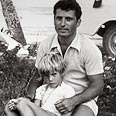
Lieutenant Colonel Avi Lanir, fell into Syrian captivity during the Yom Kippur War
My father, Lieutenant-Colonel Avi Lanir, fell into Syrian captivity during the Yom Kippur War. He was serving as a Mirage squadron commander when on the eighth day of the war his plane was hit during an operational flight over Syrian territory. He was seen by our forces as he parachuted from his aircraft, landed safely on the ground and was picked up by Syrian troops.
We know that when he fell into captivity he underwent harsh interrogations and ended up paying with his life for not talking. Nine months after the end of the war his tortured body was returned and buried in Israel.
The families of the prisoners of war and soldiers missing in action in that war got together to exert pressure on the cabinet - to obtain information about their loved ones and to secure their release. Even then the enemy was aware of the Israeli public's soft belly, and for months the Syrians withheld any information concerning the captives. The activities of that pressure group presented a new phenomenon at the time.
During my childhood my family lived at the Hatzor Air Force base. The War of Attrition was raging in full force, and many of our pilot neighbors fell into Egyptian captivity. On several occasions the wives of these pilots met with the defense minister at the time, Moshe Dayan. They pleaded with him to demonstrate flexibility and to find a way to bring their husbands home.
Dayan would send them home empty-handed while asking them to focus on bringing up their children. He, as he had assured them, would take care of security issues. Following the Yom Kippur War his statements and body language changed; everything had changed. Then as now, this testified to the weakness of the cabinet and to the rift created by the lack of public faith in the government.
Ron Arad trauma
In my family, opinions were divided between some who joined those exerting pressure and those who believed that restraint was the way to go, and that their goals and those of the government were identical.
The mother of Yoske Gross no longer asked questions. Like a lioness she fought for the return of her son at an exorbitant price, which years later prevented Prime Minister Yitzhak Rabin from completing a quick deal for the release of airman Ron Arad.
The trauma of Ron Arad's disappearance, and the successful campaign by Hizbullah captive Tennenbaum's son and daughter, led to a dubious deal that secured the release of the drug trafficker at an exorbitant price. No one was held accountable for the murdered victims and their families in the terror attacks that followed the release of terrorists in that deal.
Subsequently, since the Yom Kippur War, we have seen government after government weakened vis-à-vis the pressure exerted by the families and past traumas. Governments conduct themselves without a broad national vision and they lack level-headedness when it comes to negotiating prisoner exchanges.
It is natural and humane for every family whose son has fallen captive in enemy hands to do all it takes to secure their release - come hell or high water. It is the role of a government to rule, set policies, and realistically weigh the public benefit vis-à-vis the mitzvah of prisoner redemption.
Some say that the current public debate, its scope and the sense of a rule determined by rating will inevitably determine the fate of negotiations. My hope is that a government that sent 33 soldiers to their deaths in the last days of the Second Lebanon War in a bid to secure diplomatic achievements that it had secured anyway, would know how to decisively care for all its citizens in this current crisis.















